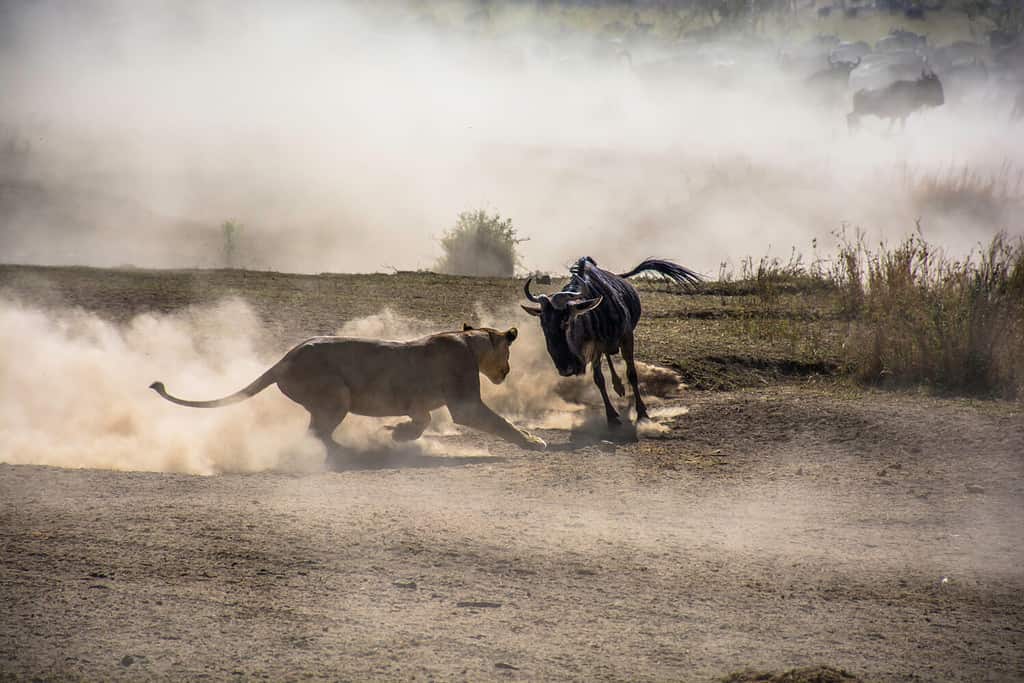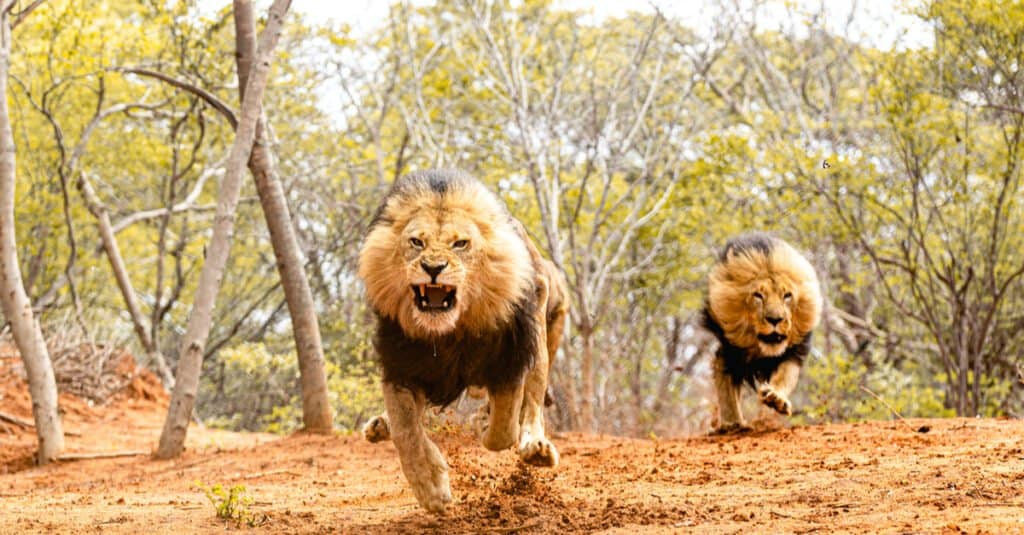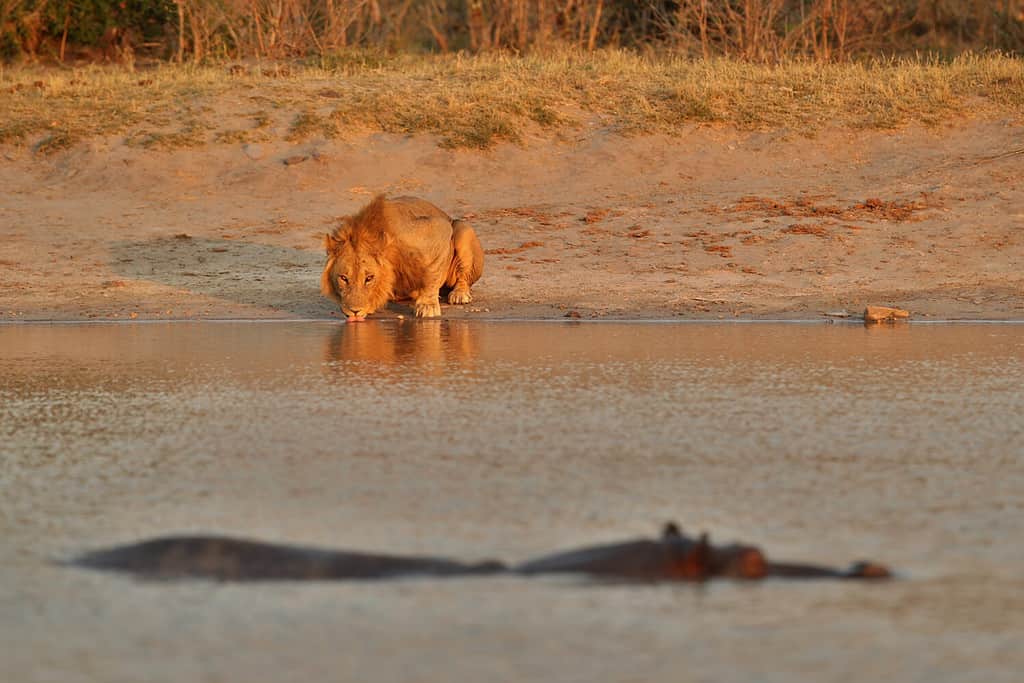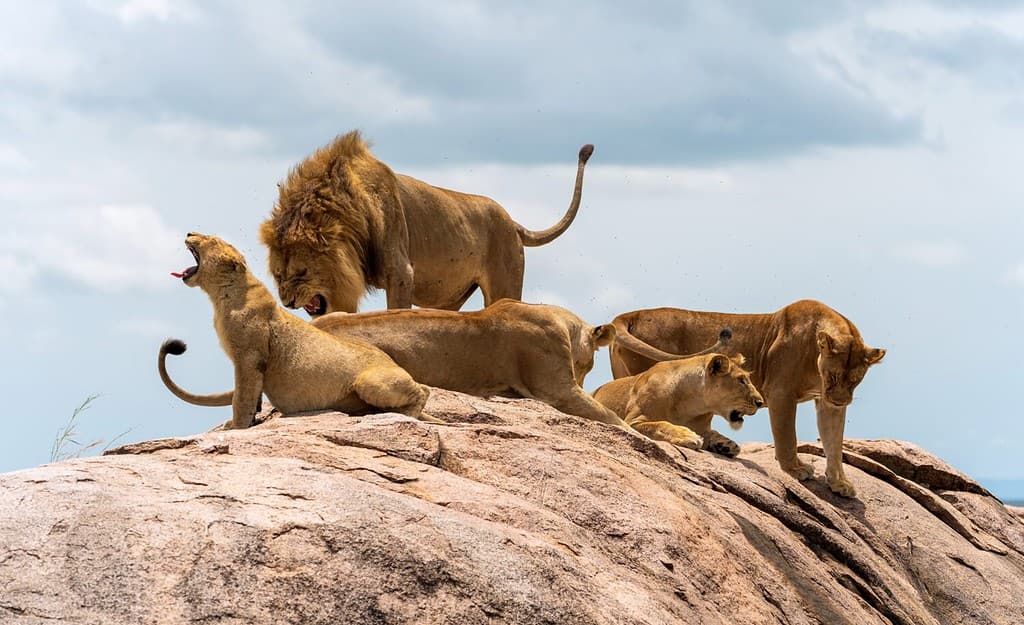Yes, Lions Can Swim! 4 Facts About These Reluctant Swimmers - A-Z Animals
Yes, lions can swim, despite our automatic mental association with lions in the fringes of the Sahara, out on the plains of Africa, and even the Indian lions of the Gir forest. Seeing a lion in the water is a rare sight. Apparently, the big cats of the wild share a natural dislike of the water with their tinier, house cat cousins.
To lions, swimming is a means to an end. If a lion sees a way to go around a body of water, and it accomplishes the same goal, it will do so. However, if a lion pride is on the hunt, the fastest route between point A and Point B is a straight line. If the straight line goes through the water, a lion will do what it must.
There are several reasons lions prefer to avoid the water if possible. Swimming, especially in the wilds of Africa, is a vulnerable activity, even for the mighty lion. Though the mental image of lions is one of kings and queens, dominating their territories, that’s not always the case, and the wily crocodile might have something to say about it.
Facts About Swimming and Lions
Lions just don’t spend a lot of time in the water. Other large cats don’t seem to have the same reluctance to take a dip. They don’t even look comfortable in the water, a surprising aspect of such sleek and powerful animals. Nevertheless, there are several reasons a lion will venture outside its element.
1. Cooling Off

©Karl Weller/Shutterstock.com
As an apex predator, lions spend an inordinate amount of time sleeping. Male lions sleep for 18 to 20 hours per day, while their female counterparts sleep for 15 to 18 hours per day. That’s a lot of snoozing. However, lions are much more active in the early hours before sunrise, taking advantage of the darkness and the cooler hours of the day.
When lions are simply unable to cool off by lazing around in the shade all day, water is the next best thing. At the height of the summer, a quick dip in the water is enough to help lions maintain their nominal body temperatures. Like most animals, lions tend to settle in areas where water is nearby.
Drinking water is both a necessity and a cooling measure as well. Of course, lions don’t need to swim to drink, but being in the water and consuming it are quick ways to regulate their internal temperatures.
2. Pursuing Prey

©Blue Slate Films/Shutterstock.com
Lions can swim when they really want to, especially when dinner decides to cross a water hole or river. If a lion is hungry enough and there is the reasonable expectation of success by continuing the pursuit, then it will take the plunge.
At the same time, lions aren’t fools. They’ll abandon pursuit if the prey has a good lead. Though lions can swim if they really want to, being in the water drastically reduces all of their advantages. As an apex predator, lions are fast and powerful. Their retractable claws are strong, sharp, and grow up to an inch and a half in length.
None of that matters in the water, and lions aren’t exactly graceful and athletic when swimming. If a lion pursues prey into a body of water, it’s because the lion believes it’s worth the effort.
3. To Get To The Other Side

©PhotocechCZ/Shutterstock.com
Of course, lions can swim when they want to go somewhere. Why did the lion cross the river? To get to the other side. Fortunately, for the rest of us, lions lack the intelligence and architectural creativity to construct a bridge, so they have to do things the old-fashioned way.
Nomadic lions (lions who do not have a pride) are more likely to cross bodies of water throughout their travels. Lacking a pride, males (and females as well, though it’s rarer) will travel extensively. Their travels aren’t random, however. Mostly, a lion nomad will follow herds of animals for obvious reasons.
Sometimes, those herds will cross a body of water, leaving the nomad little choice, unless it wants to hunt down a separate herd. Lions, as instinctive animals, don’t think that way. Here’s the herd, and it makes no sense to go elsewhere. Juvenile males and the occasional female will become nomadic, and they will spend a lot more time on the move than a typical lion with a pride at its back.
4. When They Have No Choice

©Howard Darby/Shutterstock.com
It’s a rare event to see two of nature’s most powerful predators clash. This is especially true when one is the master of the water and the other is the master of the land. Just because a lion can swim, that doesn’t mean it remains the apex predator when it’s in the water. In Africa, the water is crocodile territory. Every now and then, crocs and lions clash in an end all be all fight.
These confrontations rarely occur but, when they do happen, it’s generally for a number of reasons. These include crocodiles trying to steal a lion’s kill close to the water, a lion trying to steal a crocodile’s meal, a lion cub too close to the bank, or just a hungry croc that’s willing to take the chance.
As you might expect, lions hold their own when they are able to stand on all fours, while crocodiles have the upper hand if a lion is deep enough to suffer from the restrained movement swimming in water entails.
Final Thoughts
These four points illustrate and reinforce the understanding that lions can swim, if they really want or need to. However, it’s not exactly their cup of tea. If a lion can avoid it, it certainly will. Swimming, drinking, chasing, and fighting are all valid reasons for lions getting in the water.
But lions are the dominant force on the land. They’re apex predators that really have no need to go hunting anything in the water. Swimming is generally a means to an end, especially if they really need to cool off or have a drink, and nothing more.
The photo featured at the top of this post is © 2021 Photography/Shutterstock.com









